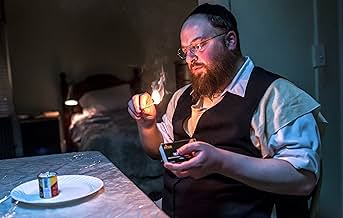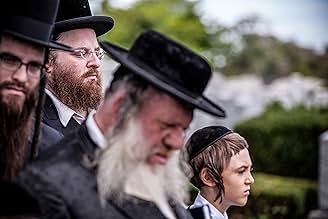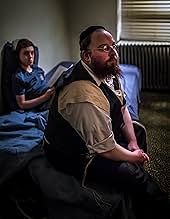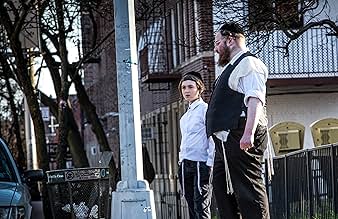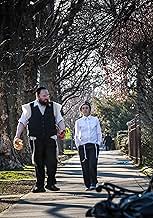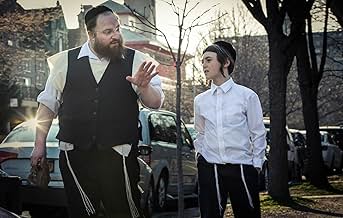NOTE IMDb
6,6/10
2,7 k
MA NOTE
Ajouter une intrigue dans votre langueWithin Brooklyn's ultra-orthodox Jewish community, a widower battles for custody of his son. A tender drama performed entirely in Yiddish, the film intimately explores the nature of faith an... Tout lireWithin Brooklyn's ultra-orthodox Jewish community, a widower battles for custody of his son. A tender drama performed entirely in Yiddish, the film intimately explores the nature of faith and the price of parenthood.Within Brooklyn's ultra-orthodox Jewish community, a widower battles for custody of his son. A tender drama performed entirely in Yiddish, the film intimately explores the nature of faith and the price of parenthood.
- Réalisation
- Scénario
- Casting principal
- Récompenses
- 7 victoires et 18 nominations au total
Meir Ber Schwartz
- The Ruv
- (as Meyer Schwartz)
Melissa Weisz
- Bayla
- (voix)
Avis à la une
"Menashe" (2017 release; 82 min.) brings the story of a widower named Menashe and his 10 yr. old son Rieven. As the movie opens, it is clear we are in the Hasidic Jewish community in New York, as we see Menashe get to work in a grocery-type store. After work, he joins others in a testy discussion as to what the "real" rules of the Hasidic Jewish community are. It's not long, though, before we learn that Menashe has a son, but, per the Hasidic Jewish rules, he cannot live with Menashe and instead is being raised by the boy's uncle (the brother of Menashe's deceased wife) and his family. Menashe is desperate to see his boy more often, and to get him to return home... At this point we are 10 min. into the movie, but to tell you more would spoil your viewing experience, you'll just have to see for yourself how it all plays out.
Couple of comments: this movie is not the first one about life in the Hasidic Jewish (or Orthodox Jewish) community, yet it is striking once again for someone like myself (a con-Jewish outsider) how incredibly restrictive life is within the confines of that community. The rabbi decides everything. When Menashe appeals to the Rabbi to let his son live with him, the Rabbi responds: "the Torah requires three things: a nice wife, a nice house, and nice dishes", without the slightest of hesitation or irony, wow... The movie reminds of a couple of other movies: "Gett" (the movie about divorce in the Orthodox Jewish community), and... "Kramer vs. Kramer", yes the 1979 classic, where Dustin Hoffman raises his 6 year old boy. Several scenes from "Menashe" are eerily similar. Beware: for whatever reason, the production team of "Menashe" decided to film many scenes in an extreme close-up angle, which at time is quite disorienting (perhaps that was the very intent of it).
"Menashe" premiered at this year's Sundance film festival to immediate critical acclaim, and recently opened at my local-art house theater here in Cincinnati. The Tuesday evening screening where I saw this at was heavily attended. somewhat to my surprise, but this is welcome news. Indeed, if you are in the mood to get a glimpse of what life in the Hasidic Jewish community is really like (almost documentary-like), you will be well-served with this movie, and I'd readily recommend you seek this out, be it in the theater, on VOD or eventually on DVD/Blu-ray.
Couple of comments: this movie is not the first one about life in the Hasidic Jewish (or Orthodox Jewish) community, yet it is striking once again for someone like myself (a con-Jewish outsider) how incredibly restrictive life is within the confines of that community. The rabbi decides everything. When Menashe appeals to the Rabbi to let his son live with him, the Rabbi responds: "the Torah requires three things: a nice wife, a nice house, and nice dishes", without the slightest of hesitation or irony, wow... The movie reminds of a couple of other movies: "Gett" (the movie about divorce in the Orthodox Jewish community), and... "Kramer vs. Kramer", yes the 1979 classic, where Dustin Hoffman raises his 6 year old boy. Several scenes from "Menashe" are eerily similar. Beware: for whatever reason, the production team of "Menashe" decided to film many scenes in an extreme close-up angle, which at time is quite disorienting (perhaps that was the very intent of it).
"Menashe" premiered at this year's Sundance film festival to immediate critical acclaim, and recently opened at my local-art house theater here in Cincinnati. The Tuesday evening screening where I saw this at was heavily attended. somewhat to my surprise, but this is welcome news. Indeed, if you are in the mood to get a glimpse of what life in the Hasidic Jewish community is really like (almost documentary-like), you will be well-served with this movie, and I'd readily recommend you seek this out, be it in the theater, on VOD or eventually on DVD/Blu-ray.
The Hasidic tradition that a child must be raised in a household where there is both a mother and a father is one of the cultural issues brought to the fore in Joshua Weinstein's bittersweet film Menashe. Co-written by Alex Lipschutz and Musa Syeed ("A Stray") and set in the Hasidic community in the Borough Park section of Brooklyn using all non-professional actors, Menashe is an engaging character study that provides rare insight into a society largely hidden from the outside world and a father's endearing love for his son and the challenges he faces strike a universal chord.
Spoken almost entirely in Yiddish, Menashe (Menashe Lustig) is a widower who wants to live his own life and raise his young son Rieven (Ruben Niborski) by himself. Unfortunately, the ultra-Orthodox community of which he is a part does not see it that way. In his opposition to Hasidic cultural norms, he risks his son's expulsion from school and jeopardizes his status in the community. Menashe wants to do right by his son, but the Talmud says that a man needs three things: a nice wife, a house and dishes (presumably no paper plates). Without a wife Menashe has to allow Rieven's gruff and super critical uncle Eizik (Yoel Weisshaus) to raise the boy. The burly, sloppy-looking Menashe fancies himself as a rebel, refusing to wear a hat and jacket required by Hasidic custom, but he is a rebel without a cause.
Weinstein, however, does not stand in judgment of his main character and tells his story in a straightforward, if not entirely sympathetic manner, but it is a hard sell. Menashe's job stocking shelves at a local market is barely enough to make a living and his ineptness draws the ire of his boss when one thousand dollars worth of gefilte fish falls out of the van he is driving. In addition, the small unkempt one-room apartment is a dubious environment to raise a child. Menashe feeds his son junk food and sodas for breakfast, but the boy, though critical of the way he treated his mother, still loves him.
The stakes are high but Menashe refuses to remarry, telling friends that his previous arranged marriage with an Israeli woman was filled with constant conflict and unhappiness and tells a beggar to avoid marriage because "it's better for your health." He goes on a date with a widowed mother with children who is not reticent about telling him what a fine husband he would make. When Menashe shows his reluctance to enter into a marriage of convenience, however, she condemns Hasidic men, saying that "First your mothers spoil you, then your wives." Menashe appeals to the rabbi (Meyer Schwartz) but he is unyielding. Eventually he takes pity and offers a compromise: Rieven can stay with Menashe for one month, but if he hasn't remarried after the anniversary of his mother's death, the boy must return to Eizik.
Desperate to prove himself to be a worthy father, Menashe asks the rabbi if he can host a memorial for his deceased wife in his small apartment. Reluctantly all agree that "even a bear can learn to dance." Menashe raises complex issues about the conflict between social acceptance, religious dogma, and human needs and desires. Unfortunately, the film's running time of eighty-two minutes seems inadequate to explore the complex issues the film raises. Weinstein, however, does not want to go there. He said, "I was interested more in the non-plot elements than the plot of the film. It was about the texture, the anecdotes, faces, moments." These poignant faces and moments are what we cannot forget.
Spoken almost entirely in Yiddish, Menashe (Menashe Lustig) is a widower who wants to live his own life and raise his young son Rieven (Ruben Niborski) by himself. Unfortunately, the ultra-Orthodox community of which he is a part does not see it that way. In his opposition to Hasidic cultural norms, he risks his son's expulsion from school and jeopardizes his status in the community. Menashe wants to do right by his son, but the Talmud says that a man needs three things: a nice wife, a house and dishes (presumably no paper plates). Without a wife Menashe has to allow Rieven's gruff and super critical uncle Eizik (Yoel Weisshaus) to raise the boy. The burly, sloppy-looking Menashe fancies himself as a rebel, refusing to wear a hat and jacket required by Hasidic custom, but he is a rebel without a cause.
Weinstein, however, does not stand in judgment of his main character and tells his story in a straightforward, if not entirely sympathetic manner, but it is a hard sell. Menashe's job stocking shelves at a local market is barely enough to make a living and his ineptness draws the ire of his boss when one thousand dollars worth of gefilte fish falls out of the van he is driving. In addition, the small unkempt one-room apartment is a dubious environment to raise a child. Menashe feeds his son junk food and sodas for breakfast, but the boy, though critical of the way he treated his mother, still loves him.
The stakes are high but Menashe refuses to remarry, telling friends that his previous arranged marriage with an Israeli woman was filled with constant conflict and unhappiness and tells a beggar to avoid marriage because "it's better for your health." He goes on a date with a widowed mother with children who is not reticent about telling him what a fine husband he would make. When Menashe shows his reluctance to enter into a marriage of convenience, however, she condemns Hasidic men, saying that "First your mothers spoil you, then your wives." Menashe appeals to the rabbi (Meyer Schwartz) but he is unyielding. Eventually he takes pity and offers a compromise: Rieven can stay with Menashe for one month, but if he hasn't remarried after the anniversary of his mother's death, the boy must return to Eizik.
Desperate to prove himself to be a worthy father, Menashe asks the rabbi if he can host a memorial for his deceased wife in his small apartment. Reluctantly all agree that "even a bear can learn to dance." Menashe raises complex issues about the conflict between social acceptance, religious dogma, and human needs and desires. Unfortunately, the film's running time of eighty-two minutes seems inadequate to explore the complex issues the film raises. Weinstein, however, does not want to go there. He said, "I was interested more in the non-plot elements than the plot of the film. It was about the texture, the anecdotes, faces, moments." These poignant faces and moments are what we cannot forget.
This particular genre is a bit like found footage horror: a lot of new film makers see it as an easy and affordable way of getting their foot in the door.
A restrained but curiously authentic feeling story that is not itself about Menashe getting remarried (as it is often advertized) but more about him dealing with the pressure to do so. There is something horribly feasible in the premise and the writing is naturalistic without ever becoming drab or dull. This is a story you can believe is happening right now in little communities all over the world and it tells this story without sensationalism or soap opera heaviness.
The narrative is fragmented into episodes of Menashe having fun with his son, doing his job and Jewish stuff. It's a serene and rather charming vision into the life of someone is really just a regular guy, he happens to just be part of a particular community he has no desire to subvert or part from, yet find himself victim to the values he has implicitly accepted.
The film is at its most charming when Menashe is with his son. The details of this brand of Judaism which Menashe tries uphold and pass down to him really make the movie memorable and touching while those very same values strive to keep them apart.
This will not be everyone's cup of tea: although nothing transgressive it will simply be too leisurely and uneventful for many people and this is indeed a movie where you just have to feel the moment: the prayers at a cemetery, picking a painting of a Rabbi etc. You may easily find it hard to stay awake or watch this in one sitting. But for what it is, it is pretty much note perfect and leaves you with a powerful sense of the quite desperation and helplessness that so many of us just have to live with.
There is a moment where I was holding my breath, you'll know it when you see it...
A restrained but curiously authentic feeling story that is not itself about Menashe getting remarried (as it is often advertized) but more about him dealing with the pressure to do so. There is something horribly feasible in the premise and the writing is naturalistic without ever becoming drab or dull. This is a story you can believe is happening right now in little communities all over the world and it tells this story without sensationalism or soap opera heaviness.
The narrative is fragmented into episodes of Menashe having fun with his son, doing his job and Jewish stuff. It's a serene and rather charming vision into the life of someone is really just a regular guy, he happens to just be part of a particular community he has no desire to subvert or part from, yet find himself victim to the values he has implicitly accepted.
The film is at its most charming when Menashe is with his son. The details of this brand of Judaism which Menashe tries uphold and pass down to him really make the movie memorable and touching while those very same values strive to keep them apart.
This will not be everyone's cup of tea: although nothing transgressive it will simply be too leisurely and uneventful for many people and this is indeed a movie where you just have to feel the moment: the prayers at a cemetery, picking a painting of a Rabbi etc. You may easily find it hard to stay awake or watch this in one sitting. But for what it is, it is pretty much note perfect and leaves you with a powerful sense of the quite desperation and helplessness that so many of us just have to live with.
There is a moment where I was holding my breath, you'll know it when you see it...
This quiet drama portrays the scuffling life of a man within the Hasidic community in Brooklyn as he endeavors to regain custody of his son in the aftermath of his wife's passing. He is expected to find a new wife and achieve stability as he holds down a low-paying, labor-intensive job as a grocery clerk that drains him of his time and his spirit. He has difficulty keeping his own modest life in order, let alone being strong enough to provide for another human being.
His efforts to better himself in order to regain custody of his son are met with dismissal from those around him, including his more devout and financially stable brother-in-law whom the community has decided should look after the man's son. He gets little encouragement from those within his community, yet he persists.
There is a considerable schism within the Hasidic community that comes to light in this film, especially on account of the man's less-than-pious lifestyle and more secular demeanor. He doesn't readily embrace the hard-line teachings of his sect as forcefully as his peers, but he nevertheless wants what's best for his son and wants to fulfill the requirements of his denomination in order to remain a real father. In that regard, this is an exceptional portrayal of loyalty to one's religious faith in the face of ongoing personal conflict. It's definitely not for many viewers who wouldn't relate to religious doctrine as a deciding force in one's life, but it's still a story that's effectively conveyed and devoid of proselytizing. Recommended to open-minded viewers.
His efforts to better himself in order to regain custody of his son are met with dismissal from those around him, including his more devout and financially stable brother-in-law whom the community has decided should look after the man's son. He gets little encouragement from those within his community, yet he persists.
There is a considerable schism within the Hasidic community that comes to light in this film, especially on account of the man's less-than-pious lifestyle and more secular demeanor. He doesn't readily embrace the hard-line teachings of his sect as forcefully as his peers, but he nevertheless wants what's best for his son and wants to fulfill the requirements of his denomination in order to remain a real father. In that regard, this is an exceptional portrayal of loyalty to one's religious faith in the face of ongoing personal conflict. It's definitely not for many viewers who wouldn't relate to religious doctrine as a deciding force in one's life, but it's still a story that's effectively conveyed and devoid of proselytizing. Recommended to open-minded viewers.
Really like the film.
I'm hoping that I got a pretty actuate perceptive on the Hasidic Jewish community. I'm aware of some aspects about how women are treated as a whole, which for me, made it more interesting that the movie tells a story about a widowed father trying to raise his son in a society that says he can't do it.You don't see that enough in movies in general. A man doing what he has to to be a man in order to raise his child alone, and I'm seeing it in the most rarest prospective.
It reminds me of Moonlight, it's not really a story I've never herd before but nobody tells the story from this unique angel.
Brilliant! http://cinemagardens.com
I'm hoping that I got a pretty actuate perceptive on the Hasidic Jewish community. I'm aware of some aspects about how women are treated as a whole, which for me, made it more interesting that the movie tells a story about a widowed father trying to raise his son in a society that says he can't do it.You don't see that enough in movies in general. A man doing what he has to to be a man in order to raise his child alone, and I'm seeing it in the most rarest prospective.
It reminds me of Moonlight, it's not really a story I've never herd before but nobody tells the story from this unique angel.
Brilliant! http://cinemagardens.com
Le saviez-vous
- AnecdotesDirector Joshua Z Weinstein, who is neither a member of a Haredi community nor a speaker of Yiddish, used a translator on set.
- Bandes originalesIvdu Es Hashem Mit Simcha
Written and performed by Michoel Schnitzler
Courtesy of Michoel Schnitzler
Meilleurs choix
Connectez-vous pour évaluer et suivre la liste de favoris afin de recevoir des recommandations personnalisées
- How long is Menashe?Alimenté par Alexa
Détails
- Date de sortie
- Pays d’origine
- Site officiel
- Langues
- Aussi connu sous le nom de
- Menashe
- Lieux de tournage
- Sociétés de production
- Voir plus de crédits d'entreprise sur IMDbPro
Box-office
- Montant brut aux États-Unis et au Canada
- 1 703 036 $US
- Week-end de sortie aux États-Unis et au Canada
- 62 078 $US
- 30 juil. 2017
- Montant brut mondial
- 1 962 265 $US
- Durée
- 1h 22min(82 min)
- Couleur
- Mixage
- Rapport de forme
- 2.00 : 1
Contribuer à cette page
Suggérer une modification ou ajouter du contenu manquant




